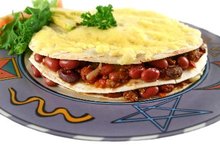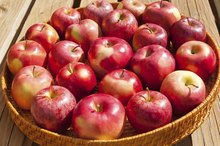List of Complex Sugars
Unlike simple sugars, complex carbohydrates, also known as complex sugars, require more work to metabolize. Simple sugars quickly absorb into the bloodstream providing a quick rush of energy, according to Kids Health. Complex carbohydrates, however, take longer to digest and generally accompany a variety of vitamins and minerals. There are several complex sugars that you can eat to benefit your health.
Cereals
According to the Academy of Nutrition and Dietetics whole grains which are a complex carbohydrate provide the vitamins, nutrients and minerals needed to keep your family healthy and strong. They also contain dietary fiber, which may help reduce your risk of heart disease, cancer, diabetes and other health complications . Simple sugars in one slice of white bread, for example, only contain 0.6 g of fiber, whereas the complex carbohydrates in one slice of wheat bread have 1.9 g of fiber. Whole grains retain the bran and germ that milled items no longer have.
Legumes
Brown Rice Pasta Nutrition
Learn More
Legumes are part of the “starchy” food group that contains complex carbohydrates. String beans, navy beans and black beans, for example, contain complex carbohydrates as well as ample amount of protein, according to Audrey Ensminger in the book “Foods and Nutrition Encyclopedia.” MedlinePlus recommends eating lentils and dried peas to increase complex carbohydrate intake and healthy nutrients.
Whole Wheat Pasta
Whole wheat pasta is an excellent source of complex carbohydrates. Since it is made using unrefined wheat, it retains much of its nutritional value, including phytic acid, phenolic acid and ferulic acid, which are present in the bran of the wheat, according to the book "Functional Foods," by G. Mazza. Subtituting whole wheat pasta for milled pasta varieties also provides essential amounts of fiber.
Related Articles
References
- Kids Health: Carbohydrates, Sugar and Your Child
- “Foods & Nutrition Encylopeidia;” Audrey Ensminger; 1994
- MedlinePlus: Carbohydrates
- “Functional Foods;” G. Mazza; 1998
Writer Bio
Skyler White is an avid writer and anthropologist who has written for numerous publications. As a writing professional since 2005, White's areas of interests include lifestyle, business, medicine, forensics, animals and green living. She has a Bachelor of Arts in anthropology from San Francisco State University and a Master of Science in forensic science from Pace University.









